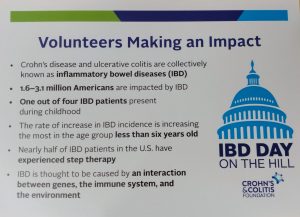As I walked up the steps toward Capitol Hill, the realization finally struck: I was really doing this. I was really lobbying for better healthcare legislation for patients like myself. More than 100 volunteers and I had traveled from all over the country to Washington, D.C., as part of the Crohn’s & Colitis Foundation’s Day on the Hill program (DOH). And we all shared one mission: to bring our stories forward to advocate for improvements in legislation for all of us suffering from inflammatory bowel disease (IBD).

This was the first time I had lobbied for anything, let alone for IBD. I was nervous and excited all at once. All these years of suffering, medication trials, and surgeries had amounted to something: I could now share my experiences for the greater good and be an advocate for those facing the same uphill battles I’ve had with insurance approvals.
A lot led up to DOH to help us prepare. We attended webinars and conference calls while researching our senators and congressmen. We received training on how to speak to legislative staff about the two bills we were lobbying: HR2077 Restoring the Patient’s Voice Act (for step therapy) and S1194/HR2587 The Medical Nutrition Equity Act. Most importantly, we prepared for how our stories related to these two bills.
To elaborate, “step therapy” is a cost-saving insurance protocol that requires patients to fill an insurer-preferred medication before receiving coverage for the physician-prescribed medication. This bill would require insurance companies to implement a clear appeals process and a quick turnaround for appeals (within 24 to 72 hours). It establishes circumstances in which a patient could be exempt from step therapy (when contraindications exist due to other medical diagnoses or allergic reactions are possible, for example).

The second bill, the Medical Nutrition Equity Act, would ensure that insurance covers medically necessary foods for IBD patients. These foods include enteral nutrition, such as oral liquid nutrition that circumvents the use of intravenous (IV) lines and feeding tubes and still meets the minimum requirements for daily nutrition. These foods can cost anywhere from $10-60 per day, so many patients opt to have lines and tubes placed that insurance will cover. This is especially the case for pediatric patients, many of whom go into remission with a strict liquid diet. However, parents often choose more expensive feeding tubes or biologics for their children because insurance generally covers them.

How do these two bills relate to me? In 2008, I had to go through step therapy to get Remicade (infliximab) approved. During that time, I tried prednisone and mercaptopurine, which didn’t work, and then Remicade was finally approved. By then, I weighed 85 lbs. and was being fed intravenously with a peripherally inserted central catheter, or PICC line. Doctors told me it was too late and that the Remicade wasn’t effective, so I needed an emergency total proctocolectomy. I still wonder if I would have needed surgery as emergently had I taken the Remicade sooner.
Regarding the Medical Nutrition Equity Act, for two months before and after my proctocolectomy, I couldn’t keep any food down. So, I received total parenteral nutrition through a PICC line. To wean off, I was prescribed liquid nutrition several times a day for the next six to eight weeks. However, the supplements came at a heavy cost to me, which was unsustainable at the time because I lost my job and didn’t have long-term disability insurance.
So, I took these personal experiences, along with my Honored Hero story, to the legislators representing my home state of New York. In groups of four or five volunteers from each state, we took turns making our appeals in the offices of Sens. Charles Schumer and Kirsten Gillibrand and Reps. Nita Lowey and Carolyn Maloney. We asked the senators’ staff to help push HR2077 into the Senate and to co-sponsor S1194. We asked the representatives’ staff to co-sponsor both bills and join the Congressional Crohn’s & Colitis Caucus to support medical research for these debilitating diseases. And the response was tremendous: The lawmakers’ aides listened attentively, showed compassion, and agreed to relay our messages.

As we now begin to send our lawmakers thank-you letters, I realize how surreal the entire experience was. I returned to New York more impassioned and emboldened than ever. As patients, we may not have control over the outcomes of our illnesses, but we can put our best foot forward to help ourselves and posterity. DOH was an important way for me to do exactly that by ensuring that the future of IBD includes better treatment and legislation.
Own your Crohn’s, own your IBD, and take charge of what you can do to make an impact to help us all lead fuller and healthier lives.

For more information on how to get involved in IBD advocacy, please visit: http://www.crohnscolitisfoundation.org/get-involved/be-an-advocate/
Follow my story on my blog site: http://ownyourcrohns.com/
Follow me on social media (Facebook, Twitter, and Instagram): @ownyourcrohns
***
Note: IBD News Today is strictly a news and information website about the disease. It does not provide medical advice, diagnosis, or treatment. This content is not intended to be a substitute for professional medical advice, diagnosis, or treatment. Always seek the advice of your physician or other qualified health providers with any questions you may have regarding a medical condition. Never disregard professional medical advice or delay in seeking it because of something you have read on this website. The opinions expressed in this column are not those of IBD News Today, or its parent company, BioNews Services, and are intended to spark discussion about issues pertaining to IBD.

